Invited Speakers
All TAGC communities come together for the Keynote Sessions, which feature big-picture talks from these inspiring speakers.
HHMI/Fred Hutchinson Cancer Research Center
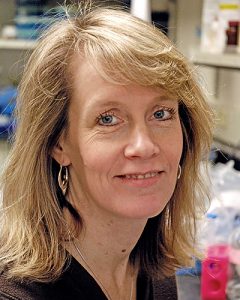 Sue Biggins studies the mechanisms that ensure accurate chromosome segregation and regulation of the cell cycle. Her lab achieved the first isolation of kinetochores and has been applying structural, biophysical and biochemical techniques to elucidate the mechanisms of kinetochore-microtubule interactions and spindle checkpoint regulation. Her lab also works on the mechanisms that ensure chromatin composition and centromere identity. Biggins is currently a Full Member at the Fred Hutchinson Cancer Research Center and an Investigator of the Howard Hughes Medical Institute.
Sue Biggins studies the mechanisms that ensure accurate chromosome segregation and regulation of the cell cycle. Her lab achieved the first isolation of kinetochores and has been applying structural, biophysical and biochemical techniques to elucidate the mechanisms of kinetochore-microtubule interactions and spindle checkpoint regulation. Her lab also works on the mechanisms that ensure chromatin composition and centromere identity. Biggins is currently a Full Member at the Fred Hutchinson Cancer Research Center and an Investigator of the Howard Hughes Medical Institute.
Impossible Foods/Stanford University
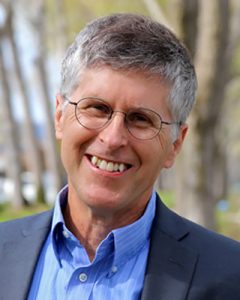 Patrick “Pat” O’Reilly Brown is chief executive and founder of Impossible Foods Inc. and professor emeritus in the Department of Biochemistry at Stanford University. Brown is co-founder of the Public Library of Science, inventor of the DNA microarray, and a former investigator at Howard Hughes Medical Institute.
Patrick “Pat” O’Reilly Brown is chief executive and founder of Impossible Foods Inc. and professor emeritus in the Department of Biochemistry at Stanford University. Brown is co-founder of the Public Library of Science, inventor of the DNA microarray, and a former investigator at Howard Hughes Medical Institute.
USDA-ARS, Cornell University
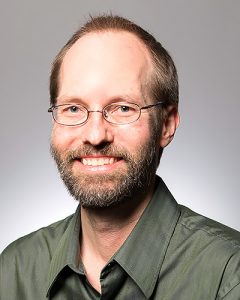 Edward S. Buckler is a Research Geneticist with the USDA-ARS and an Adjunct Professor of Plant Breeding and Genetics at Cornell University. He began his career studying molecular evolution and archaeology, which got him interested in using natural diversity to improve crops and increase sustainability. Buckler developed association mapping approaches and germplasm to pinpoint genes and find natural variation controlling many maize traits. His group has also developed a wide range of big data, bioinformatic, and molecular tools that have been used to characterize and tap diversity in over 2,000 species. Currently, his group is developing approaches to use multiple sources of biological knowledge to design sustainable energy-efficient crops that are adapted to numerous environments. Buckler has numerous leadership positions within the crop and genetics communities and is a member of the National Academy of Sciences.
Edward S. Buckler is a Research Geneticist with the USDA-ARS and an Adjunct Professor of Plant Breeding and Genetics at Cornell University. He began his career studying molecular evolution and archaeology, which got him interested in using natural diversity to improve crops and increase sustainability. Buckler developed association mapping approaches and germplasm to pinpoint genes and find natural variation controlling many maize traits. His group has also developed a wide range of big data, bioinformatic, and molecular tools that have been used to characterize and tap diversity in over 2,000 species. Currently, his group is developing approaches to use multiple sources of biological knowledge to design sustainable energy-efficient crops that are adapted to numerous environments. Buckler has numerous leadership positions within the crop and genetics communities and is a member of the National Academy of Sciences.
John Innes Centre
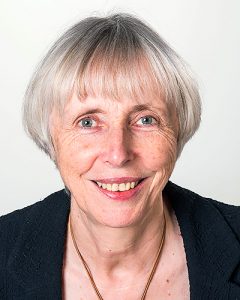 Caroline Dean has been a project leader at the John Innes Centre Norwich since 1988. Her work on seasonal timing mechanisms in plants has led into a detailed mechanistic analysis of the regulation of one Arabidopsis locus, encoding the floral repressor FLC. FLC transcription is quantitatively modulated by an antisense-mediated chromatin mechanism that coordinately influences transcription initiation and elongation. The gene is also epigenetically silenced through a cold-induced, cis-based, Polycomb switching mechanism. FLC has therefore turned out to be an excellent system to dissect conserved mechanisms by which non-coding transcription and chromatin mechanisms regulate gene expression.
Caroline Dean has been a project leader at the John Innes Centre Norwich since 1988. Her work on seasonal timing mechanisms in plants has led into a detailed mechanistic analysis of the regulation of one Arabidopsis locus, encoding the floral repressor FLC. FLC transcription is quantitatively modulated by an antisense-mediated chromatin mechanism that coordinately influences transcription initiation and elongation. The gene is also epigenetically silenced through a cold-induced, cis-based, Polycomb switching mechanism. FLC has therefore turned out to be an excellent system to dissect conserved mechanisms by which non-coding transcription and chromatin mechanisms regulate gene expression.
HHMI/UC Berkeley
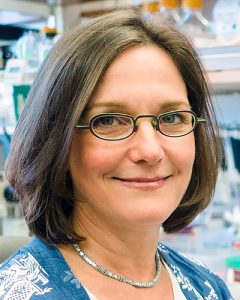 Abby Dernburg investigates how genetic information is transmitted from parents to progeny through the specialized cell division of meiosis. She received the GSA’s Larry Sandler Memorial Award for her graduate work with John Sedat at UCSF, where she explored diverse questions in chromosome biology. Her postdoctoral work with Anne Villeneuve helped to establish C. elegans as a leading model organism for molecular genetic analysis of meiosis. Since 2001 she has led a research group at Lawrence Berkeley National Laboratory and UC Berkeley, where she was also an undergraduate. She has been an HHMI Investigator since 2008.
Abby Dernburg investigates how genetic information is transmitted from parents to progeny through the specialized cell division of meiosis. She received the GSA’s Larry Sandler Memorial Award for her graduate work with John Sedat at UCSF, where she explored diverse questions in chromosome biology. Her postdoctoral work with Anne Villeneuve helped to establish C. elegans as a leading model organism for molecular genetic analysis of meiosis. Since 2001 she has led a research group at Lawrence Berkeley National Laboratory and UC Berkeley, where she was also an undergraduate. She has been an HHMI Investigator since 2008.
New York University
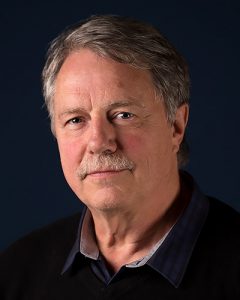 Claude Desplan is Silver Professor of Biology and Neuroscience at NYU. Born in Algeria, he trained at ENS in France. In 1983, he joined Pat O’Farrell at UCSF where he demonstrated that the homeodomain is a DNA binding motif. In 1987, he became an HHMI Assistant Investigator at Rockefeller University to pursue structural studies of the homeodomain and the evolution of axis formation.
Claude Desplan is Silver Professor of Biology and Neuroscience at NYU. Born in Algeria, he trained at ENS in France. In 1983, he joined Pat O’Farrell at UCSF where he demonstrated that the homeodomain is a DNA binding motif. In 1987, he became an HHMI Assistant Investigator at Rockefeller University to pursue structural studies of the homeodomain and the evolution of axis formation.
Harvard University
 Cassandra Extavour obtained an Honors BSc at the University of Toronto with a specialist in Molecular Genetics and Molecular Biology. She obtained her PhD with Antonio Garcia Bellido at the Severo Ochoa Center for Molecular Biology at the Autonomous University of Madrid. She performed postdoctoral work first with Michalis Averof at the Institute for Molecular Biology and Biotechnology in Crete, Greece, and subsequently with Michael Akam at the University of Cambridge. At Cambridge she received a BBSRC Research Grant and became a Research Associate in the Department of Zoology. In 2007, she established her independent laboratory as an Assistant Professor in the Department of Organismic and Evolutionary Biology at Harvard University, where she was promoted to Associate Professor in 2011 and to Full Professor in 2014. She has received numerous honors and awards and has been nominated for the Joseph R. Levenson Memorial Teaching Prize and the Harvard Graduate Women in Science and Engineering Mentoring Award. The Extavour laboratory is interested in understanding early embryonic development, the genes that control this development, the evolutionary origins of these genes, and how their functions have changed over evolutionary time.
Cassandra Extavour obtained an Honors BSc at the University of Toronto with a specialist in Molecular Genetics and Molecular Biology. She obtained her PhD with Antonio Garcia Bellido at the Severo Ochoa Center for Molecular Biology at the Autonomous University of Madrid. She performed postdoctoral work first with Michalis Averof at the Institute for Molecular Biology and Biotechnology in Crete, Greece, and subsequently with Michael Akam at the University of Cambridge. At Cambridge she received a BBSRC Research Grant and became a Research Associate in the Department of Zoology. In 2007, she established her independent laboratory as an Assistant Professor in the Department of Organismic and Evolutionary Biology at Harvard University, where she was promoted to Associate Professor in 2011 and to Full Professor in 2014. She has received numerous honors and awards and has been nominated for the Joseph R. Levenson Memorial Teaching Prize and the Harvard Graduate Women in Science and Engineering Mentoring Award. The Extavour laboratory is interested in understanding early embryonic development, the genes that control this development, the evolutionary origins of these genes, and how their functions have changed over evolutionary time.
HHMI/Rockefeller University
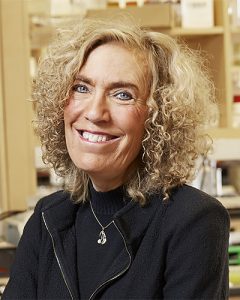 Elaine Fuchs is an American cell biologist, famous for her work on the biology and molecular mechanisms of mammalian skin and skin diseases, and has led the modernization of dermatology. Fuchs also pioneered reverse genetics approaches, which assess protein function first and then assesses its role in development and disease. In particular, Fuchs researches skin stem cells, and their production of hair and skin. As an HHMI investigator, she is currently the Rebecca C. Lancefield Professor of Mammalian Cell Biology and Development at The Rockefeller University.
Elaine Fuchs is an American cell biologist, famous for her work on the biology and molecular mechanisms of mammalian skin and skin diseases, and has led the modernization of dermatology. Fuchs also pioneered reverse genetics approaches, which assess protein function first and then assesses its role in development and disease. In particular, Fuchs researches skin stem cells, and their production of hair and skin. As an HHMI investigator, she is currently the Rebecca C. Lancefield Professor of Mammalian Cell Biology and Development at The Rockefeller University.
National Institute of General Medical Sciences
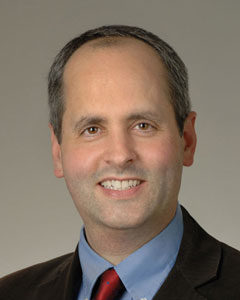 Jon R. Lorsch is the director of the National Institute of General Medical Sciences (NIGMS). In this position, Lorsch oversees the Institute’s $2.9 billion budget, which supports basic research that increases understanding of biological processes and lays the foundation for advances in disease diagnosis, treatment, and prevention. A leader in RNA biology, Lorsch studies the initiation of translation, a major step in controlling how genes are expressed. When this process goes awry, viral infection, neurodegenerative diseases and cancer can result. To dissect the mechanics of translation initiation, Lorsch and collaborators developed a yeast-based system and a wide variety of biochemical and biophysical methods. Lorsch continues this research as a tenured investigator in the NIH’s Eunice Kennedy Shriver National Institute of Child Health and Human Development.
Jon R. Lorsch is the director of the National Institute of General Medical Sciences (NIGMS). In this position, Lorsch oversees the Institute’s $2.9 billion budget, which supports basic research that increases understanding of biological processes and lays the foundation for advances in disease diagnosis, treatment, and prevention. A leader in RNA biology, Lorsch studies the initiation of translation, a major step in controlling how genes are expressed. When this process goes awry, viral infection, neurodegenerative diseases and cancer can result. To dissect the mechanics of translation initiation, Lorsch and collaborators developed a yeast-based system and a wide variety of biochemical and biophysical methods. Lorsch continues this research as a tenured investigator in the NIH’s Eunice Kennedy Shriver National Institute of Child Health and Human Development.
University of British Columbia
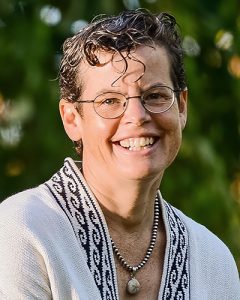 Sarah (Sally) Otto is known for her theoretical studies investigating how biological systems evolve, using models to investigate the selective forces acting on genetic systems (recombination, ploidy level, gene duplications) and mating systems (sexual vs asexual reproduction, sexual selection, floral reproductive strategies). Complementing this approach, Otto’s group tracks yeast as they evolve to test evolutionary theories. Otto helped found the Canadian Society of Ecology and Evolution and has served as President of the Society for the Study of Evolution, among other Councils and Editorial Boards. Awards include a MacArthur Fellowship, a Guggenheim Fellowship, and the Sewall Wright Award.
Sarah (Sally) Otto is known for her theoretical studies investigating how biological systems evolve, using models to investigate the selective forces acting on genetic systems (recombination, ploidy level, gene duplications) and mating systems (sexual vs asexual reproduction, sexual selection, floral reproductive strategies). Complementing this approach, Otto’s group tracks yeast as they evolve to test evolutionary theories. Otto helped found the Canadian Society of Ecology and Evolution and has served as President of the Society for the Study of Evolution, among other Councils and Editorial Boards. Awards include a MacArthur Fellowship, a Guggenheim Fellowship, and the Sewall Wright Award.
Harvard University
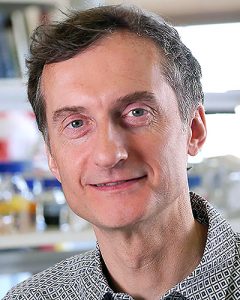 Alex Schier obtained his PhD in Walter Gehring’s lab at the Biozentrum Basel. He spent his postdoc in Wolfgang Driever’s lab, where he screened for and characterized mutants affecting zebrafish development. He started his lab in 1996 at the Skirball Institute of NYU School of Medicine and joined Harvard University in 2005. In 2019 he will return to the Biozentrum Basel. His lab has contributed to the understanding of the molecular basis of vertebrate embryogenesis and behavior and to the development of zebrafish as a model system. Schier has received NIH MERIT and PIONEER awards and was elected to EMBO.
Alex Schier obtained his PhD in Walter Gehring’s lab at the Biozentrum Basel. He spent his postdoc in Wolfgang Driever’s lab, where he screened for and characterized mutants affecting zebrafish development. He started his lab in 1996 at the Skirball Institute of NYU School of Medicine and joined Harvard University in 2005. In 2019 he will return to the Biozentrum Basel. His lab has contributed to the understanding of the molecular basis of vertebrate embryogenesis and behavior and to the development of zebrafish as a model system. Schier has received NIH MERIT and PIONEER awards and was elected to EMBO.
HHMI/St. Jude Children’s Research Hospital
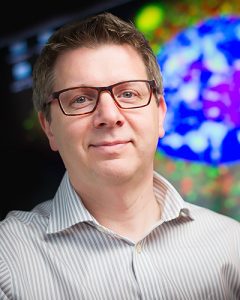 J. Paul Taylor is an Investigator of the Howard Hughes Medical Institute and the Edward Barry Endowed Chair in Cell and Molecular Biology at St. Jude Children’s Research Hospital. His research program focuses on the molecular basis of inherited neurological disorders. Among Taylor’s contributions are the co-discovery that intrinsically disordered protein segments mediate phase transitions that underlie the assembly membrane-less organelles such as RNA granules. He also discovered several disease-causing mutations in RNA-binding proteins that impair phase transitions. He has advanced the hypothesis that disturbance of biological phase transitions is a frequent cause of disease.
J. Paul Taylor is an Investigator of the Howard Hughes Medical Institute and the Edward Barry Endowed Chair in Cell and Molecular Biology at St. Jude Children’s Research Hospital. His research program focuses on the molecular basis of inherited neurological disorders. Among Taylor’s contributions are the co-discovery that intrinsically disordered protein segments mediate phase transitions that underlie the assembly membrane-less organelles such as RNA granules. He also discovered several disease-causing mutations in RNA-binding proteins that impair phase transitions. He has advanced the hypothesis that disturbance of biological phase transitions is a frequent cause of disease.
University of Texas at Austin
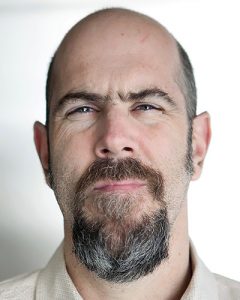 John Wallingford is a William and Gwyn Shive Endowed Professor of Molecular Biosciences at the University of Texas at Austin. Currently at the Wallingford Lab, he and his team combine in vivo imaging with systems biology to explore the cell biological basis of embryonic development.
John Wallingford is a William and Gwyn Shive Endowed Professor of Molecular Biosciences at the University of Texas at Austin. Currently at the Wallingford Lab, he and his team combine in vivo imaging with systems biology to explore the cell biological basis of embryonic development.
UC San Francisco
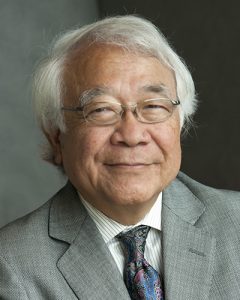 Keith Yamamoto oversees strategic planning as well as research activities at UCSF’s School of Medicine. After earning a PhD at Princeton, he came to UCSF in 1973. He served as chair of the Department of Cellular and Molecular Pharmacology from 1994 to 2003. Yamamoto is regarded as an international leader in studying the mechanisms of signaling and gene regulation by intracellular receptors.
Keith Yamamoto oversees strategic planning as well as research activities at UCSF’s School of Medicine. After earning a PhD at Princeton, he came to UCSF in 1973. He served as chair of the Department of Cellular and Molecular Pharmacology from 1994 to 2003. Yamamoto is regarded as an international leader in studying the mechanisms of signaling and gene regulation by intracellular receptors.
HHMI/Massachusetts Institute of Technology
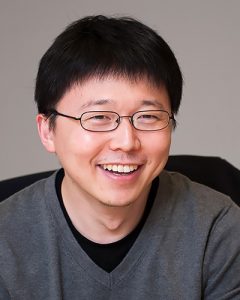 Feng Zhang is a molecular biologist focused on developing tools to improve human health. He played an integral role in the creation of two revolutionary technologies, optogenetics and CRISPR-Cas9 genome editing. Current research in the Zhang laboratory is centered on the discovery of novel biological systems and processes that can be developed into the next generation of molecular tools and therapies to study and treat human disease. Zhang is a core member of the Broad Institute, an Investigator at the McGovern Institute for Brain Research, the James and Patricia Poitras Professor of Neuroscience at MIT, an associate professor in the departments of Brain and Cognitive Sciences and Biological Engineering at MIT, a Howard Hughes Medical Investigator, and a New York Stem Cell Foundation-Robertson Investigator. He is also a member of both the National Academy of Sciences and the American Academy of Arts and Sciences.
Feng Zhang is a molecular biologist focused on developing tools to improve human health. He played an integral role in the creation of two revolutionary technologies, optogenetics and CRISPR-Cas9 genome editing. Current research in the Zhang laboratory is centered on the discovery of novel biological systems and processes that can be developed into the next generation of molecular tools and therapies to study and treat human disease. Zhang is a core member of the Broad Institute, an Investigator at the McGovern Institute for Brain Research, the James and Patricia Poitras Professor of Neuroscience at MIT, an associate professor in the departments of Brain and Cognitive Sciences and Biological Engineering at MIT, a Howard Hughes Medical Investigator, and a New York Stem Cell Foundation-Robertson Investigator. He is also a member of both the National Academy of Sciences and the American Academy of Arts and Sciences.